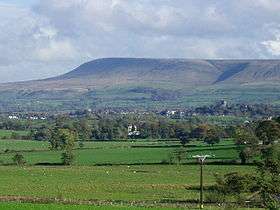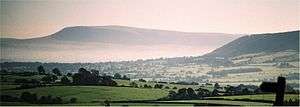Pendle Hill
| Pendle Hill | |
|---|---|
 | |
| Highest point | |
| Elevation | 557 m (1,827 ft) |
| Prominence | c. 395 metres (1,296 ft) |
| Parent peak | Kinder Scout[1] |
| Listing | Marilyn |
| Coordinates | 53°52′08″N 2°18′00″W / 53.869°N 2.3°WCoordinates: 53°52′08″N 2°18′00″W / 53.869°N 2.3°W |
| Geography | |
 Pendle Hill | |
| Location | Lancashire, England |
| OS grid | SD804414 |
| Topo map | OS Landranger 103 |

Pendle Hill is located in the east of Lancashire, England, near the towns of Burnley, Nelson, Colne, Clitheroe and Padiham. Its summit is 557 metres (1,827 ft) above mean sea level. It gives its name to the Borough of Pendle. It is an isolated hill, separated from the Pennines to the east, the Bowland Fells to the northwest, and the West Pennine Moors to the south. It is included in detached part of the Forest of Bowland Area of Outstanding Natural Beauty (AONB).[2]
Topography
Pendle Hill is separated from the nearby main bulk of the Bowland Fells by the River Ribble. This isolation means that Pendle Hill is in fact the most prominent child summit of Kinder Scout, far away in the Peak District, rather than a child of Ward's Stone, the highest point in Bowland.[1]
Geology
The sloping plateau summit of Pendle Hill is formed from the Pendle Grit, a coarse Carboniferous age sandstone assigned to the Millstone Grit Group. It overlies a thick sequence of Carboniferous Limestone beds.[3] In chronostratigraphy, the British sub-stage of the Carboniferous period, the 'Pendleian' derives its name from Pendle Hill where an exposure in Light Clough is taken as the type locality.[4][5]
Much of the lower slopes are mantled by thick deposits of glacial till or boulder clay dating from the last Ice Age. The historic decomposition of sphagnum moss on the hill has led to it being covered in peat.
The steep slopes of its eastern and southern flanks have given rise to a series of landslips.
History
The name "Pendle Hill" combines the words for hill from three different languages (as does Bredon Hill in Worcestershire) In the 13th century it was called Pennul or Penhul, apparently from the Cumbric pen and Old English hyll, both meaning "hill". The modern English "hill" was appended later, after the original meaning of Pendle had become opaque.[6]
A Bronze Age burial site has been discovered at the summit of the hill.[7]
The hill is also famous for its links to three events which took place in the 17th century: the Pendle witch trials (1612), Richard Towneley's barometer experiment (1661), and the vision of George Fox (1652), which led to the foundation of the Religious Society of Friends (Quaker) movement.[8]
The most popular route for ascending the hill begins in the village of Barley, which lies to the east. This route also provides the steepest ascent. Other nearby villages include Downham, Roughlee, Newchurch-in-Pendle, Sabden and Pendleton.
A local saying suggests the area around Pendle Hill experiences frequent rainfall: "If you can see Pendle it's about to rain, if you can't, it's already started." When the weather is fine Pendle is a popular hill-launch for paragliders and, with a north-westerly wind, for hang gliders.
Quakers
In his autobiography, George Fox described a vision on Pendle Hill in 1652, during the early years of the Quakers:
As we travelled, we came near a very great hill, called Pendle Hill, and I was moved of the Lord to go up to the top of it; which I did with difficulty, it was so very steep and high. When I was come to the top, I saw the sea bordering upon Lancashire. From the top of this hill the Lord let me see in what places he had a great people to be gathered.— George Fox: An Autobiography, Chapter 6
Today Pendle remains strongly linked to the Quakers, giving its name to one of their centres for religious and spiritual study and contemplation near Philadelphia, Pennsylvania, in the United States.[9]
Witches and the supernatural
The story of the Pendle witches is a notorious and well-documented example of cases brought against alleged witches in 17th-century England.[10] The hill continues to be associated with witchcraft; large numbers of visitors climb it every Halloween, although in recent years people have been discouraged by the authorities.
The area is popular with ghost hunters after Living channel's show Most Haunted visited it for a live investigation on Halloween 2004.[11] The show's presenter, Yvette Fielding, said it was the scariest episode they had made.
Pendle Hill and the surrounding area are the setting for 1951's classic Mist Over Pendle by Robert Neill, and also for the fourth book in Joseph Delaney's The Wardstone Chronicles, called The Spook's Battle.
.jpg)
References
Notes
- 1 2 Mark Jackson, More relative hills of Britain, www.hill-bagging.co.uk, pp 140-41
- ↑ Forest of Bowland map (Map). forestofbowland.com. Lancashire County Council.
- ↑ Institute of Geological Sciences (British Geological Survey) 1975. England and Wales 1:50,000 scale geological map sheet 68 drift Edition Clitheroe
- ↑ Harland, W.B. 1990 A Geologic Time Scale 1989, Cambridge University Press p44
- ↑ http://core.ac.uk/download/pdf/386668.pdf
- ↑ "A Landscape Strategy for Lancashire — Landscape Character Assessment" (PDF). Lancashire County Council. 2000. p. 12. Retrieved 13 September 2015.
- ↑ "Pendle Hill". Pendle Hill.
- ↑ Rowe, Mark (17 June 2012). "Pendle: Don't follow the crowds, follow the witches". The Independent. Retrieved 5 September 2015.
- ↑ "Home - Pendle Hill, a Quaker study, retreat, and conference center near Philadelphia, Pennsylvania". Pendle Hill. Retrieved 17 January 2015.
- ↑ Sharpe 2002, p. 1
- ↑ 'Most Haunted' crew has a spooky visit to Pendle Clitheroe Advertiser, 5 November 2004. Accessed 29 March 2008.
Bibliography
- Sharpe, James (2002), "The Lancaster witches in historical context", in Poole, Robert, The Lancashire Witches: Histories and Stories, Manchester University Press, pp. 1–18, ISBN 978-0-7190-6204-9
External links
| Wikimedia Commons has media related to Pendle Hill. |
- Walking Pages: Pendle
- A circuit of Pendle Hill from Barley
- Computer generated summit panorama Pendle Hill index
- Images of Pendle hill on Flickr
- Live webcam view of Pendle Hill